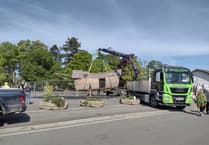Police are on the hunt for a group of people suspected of disturbing a protected site at Berry Pomeroy Castle in Totnes during the night.
The case of Nighthawking - a term used to describe archaeological artefacts that have been stolen from a protected site under the cover of darkness - is believed to have happened on Sunday, January 28.
About six people used a metal detector to dig up about 10 patches of grass before placing them back.
Police released security camera photos of one of the suspects and confirmed that the group could have caused damage to the surrounding area.
The castle, one of the largest in the south west of England, dates back to the 15th century.
The gravity of the incident was highlighted by English Heritage curator Win Scutt, who said the damage to the site could be “irreversible”.
Mr Scutt, who is the senior properties curator at the organisation, said: “Unskilled digging of holes on a nationally important site like this is irreversible. We shall never know how much knowledge has been lost about the history of Berry Pomeroy Castle due to this disturbance of the buried archaeology.”
Mark Harrison, Head of Heritage Crime for Historic England, pointed out that the “overwhelming majority of metal detectorists comply with the law”.
However, police said that anyone found guilty of offences under the Ancient Monuments and Archaeological Areas Act can receive a substantial fine and even a jail term.
PC Julian Fry, the rural affairs officer for Devon and Cornwall Police, appealed for help to identify the culprits, confirming that the incident took place in the early hours of Sunday morning under the cover of darkness.
“We are currently working closely with experts from Historic England and English Heritage as part of our enquiries,” he added.
Although there is no recent data available on Nighthawking, a survey involving more than 400 heritage-related groups across the country showed that a total of 240 sites were reportedly affected by Nighthawking between 1995 and 2008, of which 88 were Scheduled Monuments, which are protected archaeological or historic sites.
Anyone with information can approach independent charity Crimestoppers anonymously by calling 0800 555 111, or via its website www.crimestoppers-uk.org.




Comments
This article has no comments yet. Be the first to leave a comment.